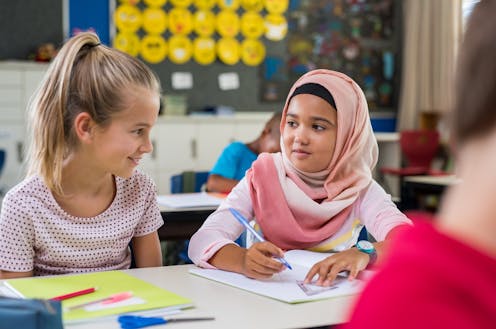'They're really keen for us to do better than they did': how refugee parents motivate their kids' learning
- Written by Hannah Soong, Senior Lecturer and Socio-cultural researcher, UniSA Education Futures, University of South Australia

Refugees struggle to find meaningful employment in Australia. In 2010, the Refugee Council of Australia found people who came to Australia on refugee or humanitarian visas remained “the worst off of the migrant visa groups” when it came to employment. Around 12% were unemployed 18 months after arrival, compared to 8% of those who came on family visas.
Education – and particularly opportunities for university education – gives people with a refugee background the means to significantly improve their lives and socioeconomic status. People with refugee backgrounds hope for a better life for their children than the one they had, and they see education as crucial step in this journey.
But we know little about the role refugee parents play in influencing their children’s educational and long-term success.
My research focused on refugee families whose children performed well in school and university. We interviewed 50 refugee parents, children and their teachers to find out whether particular values of refugee families influenced the children educationally.
We found parents who took the refugee journey to secure a good life for their family indirectly influenced their children to work hard like they did, and to strive for the kind of life denied to them.
‘They wanted us to make something of ourselves’
The parents who participated in the research varied in their levels of education – from no formal schooling to having a PhD. Most parents did the interview in their first language with either a professional interpreter, a bilingual school services officer or an adult child interpreting.
Read more: Refugee students struggle with displacement and trauma. Here are 3 ways schools can help them belong
Their cultural backgrounds varied widely too: interviewees included refugees from Afghanistan, Nepal, Rwanda, Syria, Vietnam and Bhutan. While all parents were first-generation refugees, the time their children had spent in Australia varied too: some had been born here, others came here as a child, while some arrived more recently as an adolescent.
The refugee parents generally had high hopes for the opportunities education could provide for their children because they were denied the right to it in their home country or in refugee camps. From the interviews with the children, we found the parents’ high values around education motivated their children to put more effort into learning.
Interpreter for Afghanistan-born parent Ahmad told us:
The main inspiration for [the parent] is that no one in his family had an opportunity to have a higher education. So, his children will be the first one in his family that […] will be educated enough […] with a higher qualification […] They can’t help them with their [child’s] learning, but the only thing that they provide is to care about them. They advise them about their education, how you can be successful through education […]
The children, both at a younger age and as adults, were very aware of their parents’ impact on their ability to achieve well academically. But the parental motivation didn’t cross over into pressure.
Alayna, who is 12 years old, was born in Iran to Hazara parents. She said she was confident her parents would still be proud of her chasing her own dreams, even if they didn’t align with theirs.
My mum really wants me to be a doctor because doctor is a good job, and […] if I don’t choose to be a dentist or a doctor or a teacher (I can still be) a useful person for the world, they will be totally proud of me.
Shipa in her 20s, born in Nepal to Bhutanese parents of Nepalese ethnicity, told us:
A strong message from my family that I have to study (because) without education, there’s nothing […] but they also have trust (that) I can do it. It’s really positive and very exciting to be […] at the university as a refugee with uneducated parents […] I just wanted to be an educated girl.
Ester, who is 18 years old, was born in Tanzania to Burundian parents. She said:
They just wanted us to focus on school […] they’re really keen for us to do better than they did […] because we’ve got an opportunity to come to Australia […] they didn’t want us to waste it. They wanted us to […] make something of ourselves.
Parents don’t need to be directly involved
Refugee parents have barriers to getting involved in their child’s education in the same way local parents do. For instance, some local parents volunteer in learning activities or attend informal meetings about school-related issues. They may help with homework and regularly meet with their child’s teacher.
Refugee parents often face cultural and language barriers when it comes to these ways of offering support. But they act as indirect influences in their children’s lives. They do so through raising a child in a family with a history of taking risks for a more secure and better life, and one that regularly communicates this shared history and the aspirations that come from it with their children.
Read more: Why some migrant school students do better than their local peers (they're not 'just smarter')
In this way, children are more likely to confidently pursue their own aspirations while valuing those of their parents. They are intrinsically self-motivated with a strong belief in their own abilities.
Authors: Hannah Soong, Senior Lecturer and Socio-cultural researcher, UniSA Education Futures, University of South Australia





